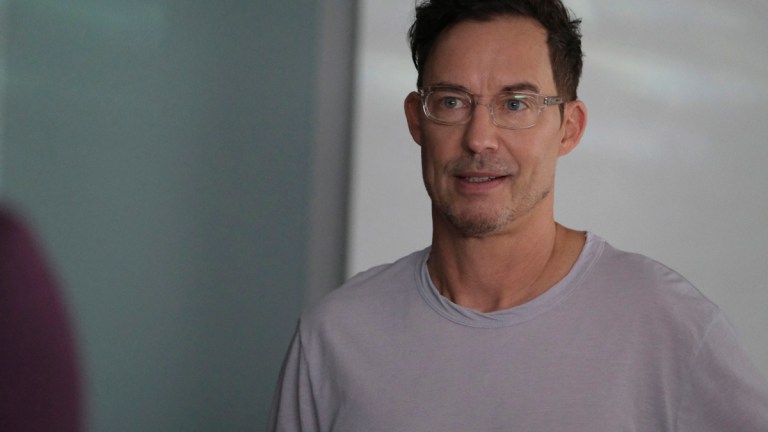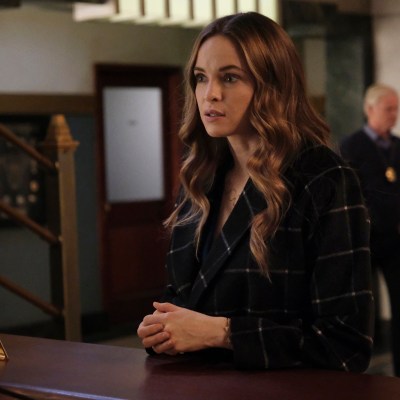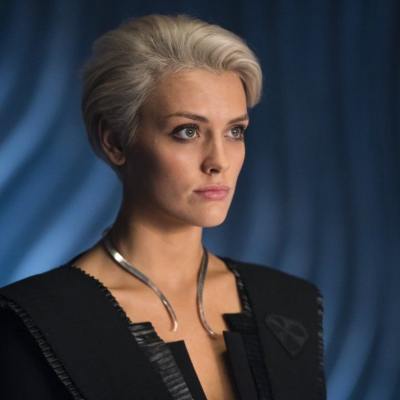The Flash: The Long Slow Decline of Harrison Wells
The Flash theoretically said goodbye to original cast member Tom Cavanagh this week, but if we’re honest Harrison Wells has been narratively MIA for a while.

The following contains The Flash spoilers.
Though The Flash Season 7 episode “Timeless” is a largely forgettable mishmash of bad time travel logic and mixed messages about whether the “Forces” that have dominated this season to date are powerful god beings or sadly manipulated humans in need of quasi-parental love from Barry and Iris, it is memorable in one aspect: Theoretically, it is the last gasp of Harrison Wells.
Sure, we’ve said goodbye to at least a half dozen versions of Wells over the years only to see a new one pop up several episodes later, like a multiverse-spanning game of Whack-a-Mole. But this time, it’s different. Star Tom Cavanagh has decided to leave the show, and though the official line is he may well return for guest appearances down the road, it doesn’t sound like that’s likely to happen anytime soon.
Which, to be honest, is understandable – this is a show that hasn’t known what to do with him or his character for several years now. No one should really be that surprised Cavanagh has finally decided to depart Central City; the real mystery is why the powers that be kept this character around for so long after they’d clearly lost all interest in telling any version of his story.
The shock reveal way back in The Flash Season 1 that STAR Labs owner Harrison Wells was secretly Reverse Flash Eobard Thawne rocked the world of the show. And Cavanagh’s electric performance, which shifted between kind, friendly mentor and terrifying, manipulative menace with ease, is a big reason that twist worked as well as it did. Of course, everyone wanted to keep the actor around after that – and rightly so! Enter Harry Wells, the gruff and cynical STAR Labs founder from Earth-2 forced to spy on Team Flash after his daughter was kidnapped by the evil speedster known as Zoom.
To be fair, the transformations probably should have just stopped right there. Harry was the first and by far the best replacement Wells and a fantastic character in his own right – damaged, loving, brilliant, and brave. His quest to save his daughter was both moving and meaningful, and resulted in lasting consequences for everyone it touched. His character experienced real growth and became a better man thanks to his experiences with Team Flash.
But rather than truly continue to build on Harry’s story, The Flash sent him back to Earth-2 and introduced a third Wells, a sweet but largely dim version known as H.R., for Season 3. And the character has never been the same since.
The Flash has always loved to play with doppelgangers – it’s how we got Killer Frost in the first place, and for that I’ll always be grateful – but they’re also one of the show’s worst crutches. If another version of the same person always exists somewhere, then no consequences are ever truly lasting.
H.R. sacrificed himself to save Iris from Savitar, but how much does that really matter when a fourth Wells – this time a mysterious detective known as Sherloque, complete with a dreadful French accent – is on the scene by the next season premiere? When that person will inevitably join Team Flash in virtually the exact same role as his predecessor(s)? When we’ll have, at best, a season to get to know them? And they all essentially come with an expiration date attached?
By the time adventurer Nash Wells shows up in Season 6, the presence of a Wells, literally any Wells, on The Flash feels more like a box that has to be checked than any kind of narrative necessity. In theory, Nash was meant to serve as an important catalyst for the massive “Crisis on Infinite Earths” crossover, but his turn as Pariah was largely forgettable. (Did he…actually do anything of real consequence? I’m not sure.)
His storied adventurer past turned out to be little more than a cover for his obsession with Allegra Garcia, a doppelganger of the young woman he loved like a daughter who died back on his Earth. His behavior towards her rapidly reached stalker-like proportions and his insistence that she somehow owed him her time or attention was deeply uncomfortable to watch.
How the mighty have indeed fallen.
The fact that “Timeless” seems to be meant as the character’s final exit comes as nothing so much as a relief at this point. And that’s a real shame. Especially because The Flash had finally brought the character full circle by resurrecting the original version of Wells, the one whose body Thawne stole so long ago, that Barry and friends had never actually had the chance to meet. Yet, the show somehow seemed to care even less about this version of Wells than any of the others that came before him, turning him into a strange hybrid of all the versions that have come before and having him choose to literally live in the past rather than face life without the wife he lost.
Granted, this is a superhero show that frequently features alternate Earths, multiple timelines and time travel, so even though there may not be a Wells in Central City at present, that doesn’t necessarily mean we’ll never see them again. But as “Timeless” illustrates, bringing back old favorites – or keeping them around for too long – without giving them a clear reason for being there is almost worse than never bringing them back at all.
Wells’ presence in this episode feels perfunctory, and though what must be his dozenth heartfelt goodbye with Cisco by now is still moving – Cavanagh’s chemistry with Carlos Valdes is truly undefeated – his appearance adds nothing to the character. There’s no exploration of what it means that he is both one Wells and all Wells-es, and the annoying time-travel twist that he’d seen himself back in “Mother” added almost nothing to the story. (Though it did at least close the loophole of his expression in that episode. For all the good it did.)
If this was truly the last hurrah of Harrison Wells as a The Flash regular, virtually every version (except maybe Sherloque) deserved better than this.


